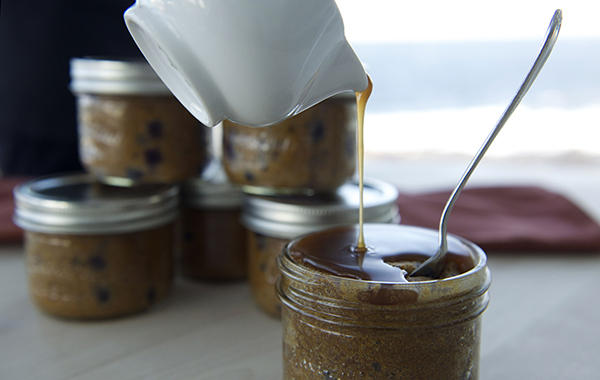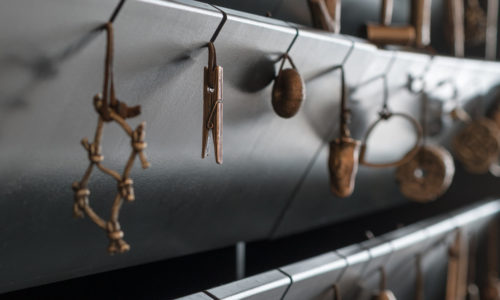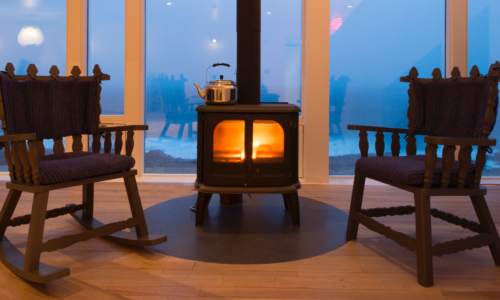In Culinary | By Fogo Island Inn | December 17, 2018
Cooking up a Traditional Newfoundland Christmas
Christmas is a time for toasting and feasting with family and friends on Fogo Island. Many of the time-honoured food and drink traditions popular on these shores today, arrived from England, Ireland and Mediterranean Europe with the first waves of immigrants, who came here to fish for cod. Other seasonal dishes and drinks were born of the islanders’ resourcefulness to get through the winter months using preserved ingredients, such as salted meat and fish and berry jams, and vegetables kept fresh in turf-roofed root cellars. The sweetness and spice of the season—not to mention the warming rum—comes via traditional trading routes from the Caribbean. Here are some of the most popular things people eat and drink on Fogo Island to celebrate the holiday season. What a scoff!
Tibb’s Eve Tipples
A fun tradition in Newfoundland is having drinks with friends on December 23, or Tibb’s Eve, to launch the festive season. One party staple is Newfoundland Christmas Slush, made with frozen pineapple and citrus juices, a splash of ginger ale or soda, and vodka or rum to get spirits bright. And the local answer to eggnog is Moose Milk, which was first served at parties hosted by the Canadian Armed Forces. It’s a rich concoction of dark rum, coffee liquor, vanilla ice cream or egg yolks, maple syrup and Christmas spices.
Salted Cod on Christmas Eve
In 1497, when Italian explorer Giovanni Caboto (John Cabot) reached Canada’s Grand Banks, he reported back that the cod was “so thick you could walk across their backs.” And so an industry was born and the first Europeans subsequently ventured East to fish in Newfoundland. Just like the Italians and Portuguese, many Fogo Islanders today partake in the tradition of eating salted cod on Christmas Eve. In Newfoundland, it’s often prepared in a dish called Fish and Brewis, which consists of salt cod, hard tack bread, mashed potatoes, onions and savoury, topped with fried onions and fat pork, known locally as scrunchions. Hearty and belly-warming, it’s the ultimate comfort food.
Cookies and Purity Syrup for Santa
Father Christmas has likely had his fill of whiskey, by the time his sleigh is zipping east over the North Atlantic. Thankfully islanders mix things up, by leaving out their cookies—usually soft-baked molasses and ginger ones—with a glass of juice made with Purity Syrup. Purity is an institution that has been sweetening the lives of Newfoundlanders since 1924 with packaged treats like specialty cookies, berry jams, hard candies, and soft drinks. Their famous syrup comes in fruity flavours, and one sip is guaranteed to conjure up memories of Christmas for those raised on the Rock.
Roast Turkey, Salted Beef and all the Trimmings
Fogo Islanders love the Christmas classic roast turkey, on the Big Day. But most would if it wasn’t served with its trusty sidekick salted beef, or as the British would say, corned beef. Typical sides that come with this meaty duo are figgy duff (a rich molasses and raisin steamed pudding), and boiled potatoes, turnips, carrots and cabbage. In Fogo Island’s Irish farming community of Tilting, potatoes, turnips and carrots were traditionally stored underground in a root cellar, and cabbages were preserved at just the right temperature in a cabbage house.
Sweet Treats of the Season
The people of Fogo Island like to bake year-round, but peak cake-and-cookie season is Christmas, when they rustle up favourites like snowballs and dark or light fruitcakes. Snowballs have a chocolatey, fudgey centre, and they’re rolled in shredded coconut. They’re a delicious no-bake treat that’s eagerly anticipated the rest of the year. Dark fruitcake is choc-full of dark rum-doused dried dark fruits and spices, and resembles the traditional British Christmas Cake. It gets its rich colour from brown sugar and molasses and improves with age. Light fruitcake is made with light syrup or white sugar and predominantly golden or yellow fruits—adding a splash of light rum is optional. Best enjoyed with a cup of tea or a hot rum toddy by the wood stove.
By Valerie Howes






